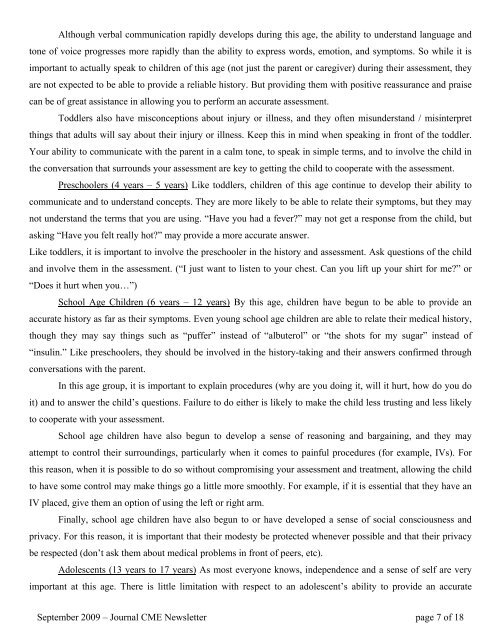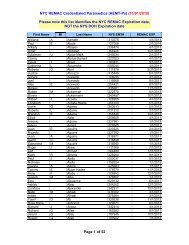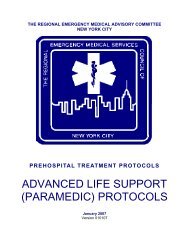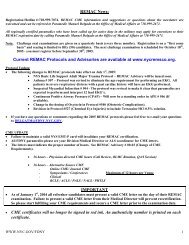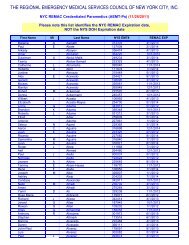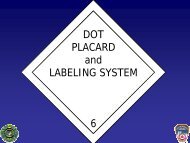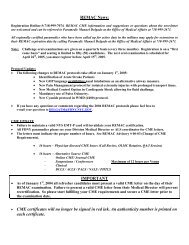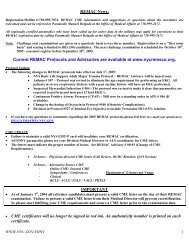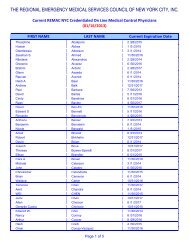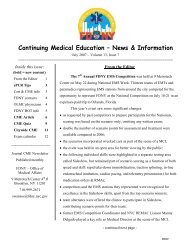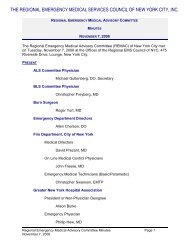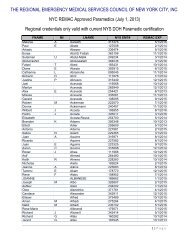Continuing Medical Education - News & Information - The Regional ...
Continuing Medical Education - News & Information - The Regional ...
Continuing Medical Education - News & Information - The Regional ...
Create successful ePaper yourself
Turn your PDF publications into a flip-book with our unique Google optimized e-Paper software.
Although verbal communication rapidly develops during this age, the ability to understand language andtone of voice progresses more rapidly than the ability to express words, emotion, and symptoms. So while it isimportant to actually speak to children of this age (not just the parent or caregiver) during their assessment, theyare not expected to be able to provide a reliable history. But providing them with positive reassurance and praisecan be of great assistance in allowing you to perform an accurate assessment.Toddlers also have misconceptions about injury or illness, and they often misunderstand / misinterpretthings that adults will say about their injury or illness. Keep this in mind when speaking in front of the toddler.Your ability to communicate with the parent in a calm tone, to speak in simple terms, and to involve the child inthe conversation that surrounds your assessment are key to getting the child to cooperate with the assessment.Preschoolers (4 years – 5 years) Like toddlers, children of this age continue to develop their ability tocommunicate and to understand concepts. <strong>The</strong>y are more likely to be able to relate their symptoms, but they maynot understand the terms that you are using. “Have you had a fever?” may not get a response from the child, butasking “Have you felt really hot?” may provide a more accurate answer.Like toddlers, it is important to involve the preschooler in the history and assessment. Ask questions of the childand involve them in the assessment. (“I just want to listen to your chest. Can you lift up your shirt for me?” or“Does it hurt when you…”)School Age Children (6 years – 12 years) By this age, children have begun to be able to provide anaccurate history as far as their symptoms. Even young school age children are able to relate their medical history,though they may say things such as “puffer” instead of “albuterol” or “the shots for my sugar” instead of“insulin.” Like preschoolers, they should be involved in the history-taking and their answers confirmed throughconversations with the parent.In this age group, it is important to explain procedures (why are you doing it, will it hurt, how do you doit) and to answer the child’s questions. Failure to do either is likely to make the child less trusting and less likelyto cooperate with your assessment.School age children have also begun to develop a sense of reasoning and bargaining, and they mayattempt to control their surroundings, particularly when it comes to painful procedures (for example, IVs). Forthis reason, when it is possible to do so without compromising your assessment and treatment, allowing the childto have some control may make things go a little more smoothly. For example, if it is essential that they have anIV placed, give them an option of using the left or right arm.Finally, school age children have also begun to or have developed a sense of social consciousness andprivacy. For this reason, it is important that their modesty be protected whenever possible and that their privacybe respected (don’t ask them about medical problems in front of peers, etc).Adolescents (13 years to 17 years) As most everyone knows, independence and a sense of self are veryimportant at this age. <strong>The</strong>re is little limitation with respect to an adolescent’s ability to provide an accurateSeptember 2009 – Journal CME <strong>News</strong>letter page 7 of 18


